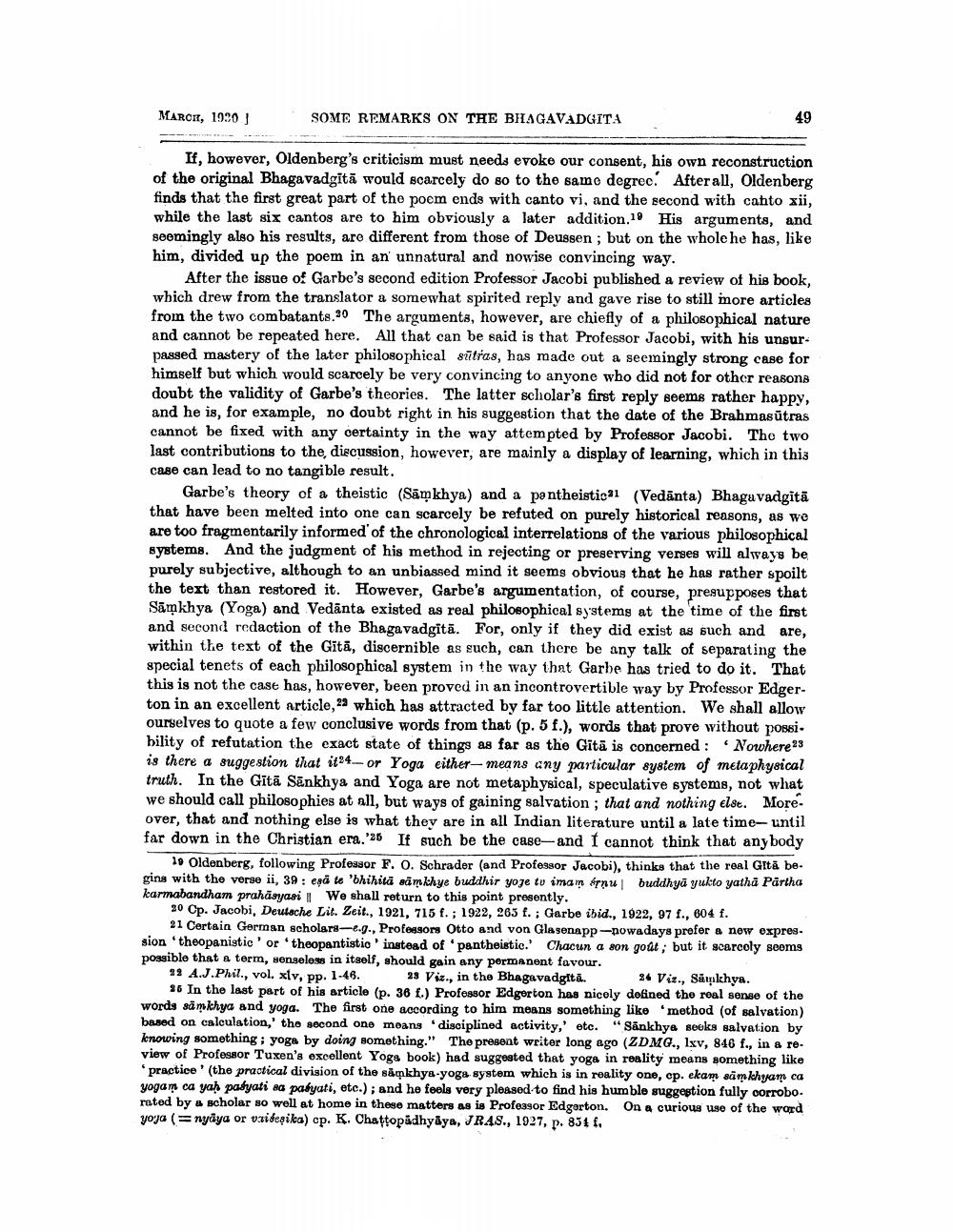________________
49
MAROK, 1930]
SOME REMARKS ON THE BHAGAVADGITA
If, however, Oldenberg's criticism must needs evoke our consent, his own reconstruction of the original Bhagavadgitā would scarcely do so to the same degrec: After all, Oldenberg finds that the first great part of the poem ends with canto vi, and the second with canto xii, while the last six cantos are to him obviously a later addition 10 His arguments, and seemingly also his results, are different from those of Deussen ; but on the whole he has, like him, divided up the poem in an unnatural and nowise convincing way.
After the issue of Garbe's second edition Professor Jacobi published a review of his book, which drew from the translator a somewhat spirited reply and gave rise to still more articles from the two combatants.29 The arguments, however, are chiefly of a philosophical nature and cannot be repeated here. All that can be said is that Professor Jacobi, with his unsurpassed mastery of the later philosophical sutras, has made out a seemingly strong case for himself but which would scarcely be very convincing to anyone who did not for other reasons doubt the validity of Garbe's theories. The latter scholar's first reply seems rather happy, and he is, for example, no doubt right in his suggestion that the date of the Brahmasūtras cannot be fixed with any certainty in the way attempted by Professor Jacobi. The two last contributions to the discussion, however, are mainly a display of learning, which in this case can lead to no tangible result.
Garbe's theory of a theistic (Samkhya) and a pontheistical (Vedānta) Bhagavadgitā that have been melted into one can scarcely be refuted on purely historical reasons, as we are too fragmentarily informed' of the chronological interrelations of the various philosophical systems. And the judgment of his method in rejecting or preserving verses will always be purely subjective, although to an unbiassed mind it seems obvious that he has rather spoilt the text than restored it. However, Garbe's argumentation, of course, presupposes that Samkhya (Yoga) and Vedanta existed as real philosophical systems at the time of the first and second redaction of the Bhagavadgitā. For, only if they did exist as such and are, within the text of the Gita, discernible as such, can there be any talk of separating the special tenets of each philosophical system in the way that Garbe has tried to do it. That this is not the case has, however, been proved in an incontrovertible way by Professor Edgerton in an excellent article, which has attracted by far too little attention. We shall allow ourselves to quote a few conclusive words from that (p. 5 f.), words that prove without possi. bility of refutation the exact state of things as far as the Gitā is concerned : Nowhere 23 is there a suggestion that it24 or Yoga either- means any particular system of metaphysical truth. In the Gītā Sankhya and Yoga are not metaphysical, speculative systems, not what we should call philosophies at all, but ways of gaining salvation ; that and nothing elst. More. over, that and nothing else is what they are in all Indian literature until a late time- until far down in the Christian era.'26 It such be the case--and I cannot think that anybody
10 Oldenberg, following Professor F. O. Schrader (and Professor Jacobi), thinks that the real Gitā be. gins with the verse ii, 39 : exå to 'bhihita amkhye buddhir yoge tu imam érnu buddhyā yukto yatha Partha karmabandham prahäsyasi | We shall return to this point presently.
30 Cp. Jacobi, Deutsche Lit. Zeit., 1921, 715 f. ; 1922, 265 f. ; Garbe ibid., 1922, 97 f., 604 f.
21 Certain German scholars-.g., Professors Otto and von Glasenapp-nowadays prefer a new expres. sion 'theopanistic' or 'theopantistio ' instead of 'pantheistic. Chacun a son goat, but it searcoly seems possible that a term, senseless in itself, should gain any permanent favour.
22 A.J.Phil., vol. xlv, pp. 1-46. 28 Viz., in the Bhagavadgitā. 24 Vix., Săukhya.
36 In the last part of his article (p. 36 1.) Professor Edgerton has nicoly defined the real sense of the words sämkhya and yoga. The first one according to him means something like 'method (of salvation) based on calculation, the second one moans disciplined activity, etc. "Sankhya seoks salvation by knowing something ; yoga by doing something." The present writer long ago (ZDMG., lxv, 846 f., in a review of Professor Tuxen's excellent Yoga book) had suggested that yoga in reality means something like
practice' (the practical division of the sámkhya-yoga system which is in reality one, op. ekam samkhyam ca yogam ca yah pafyati na pasyati, etc.); and he feels very pleased to find his humble suggestion fully corrobo. rated by a scholar so well at home in these matters as is Professor Edgerton. On a curious use of the word yoya ( =nyaya or vzideşila) cp. K. Chattopadhyaya, JR48., 1927, p. 851 f.




